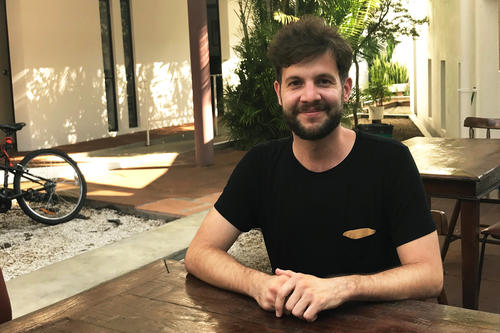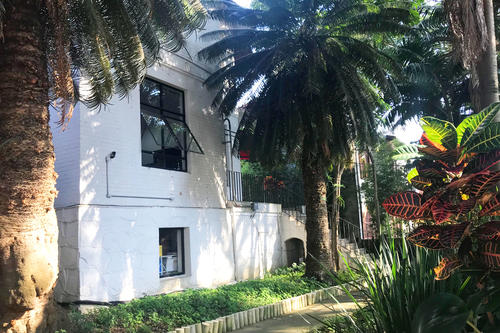Researching Inequality Together
A Merian research center founded in 2017 brings together European and Latin American research on coexistence in unequal societies – a report on where things stand
Oct 09, 2018
São Paulo is Brazil’s most important center of economic activity, finance, and culture. It is home to more than 12 million people from about 100 different ethnic groups.
Image Credit: ckturistando on Unsplash
Nicolas Wasser, a graduate of the Institute for Latin American Studies at Freie Universität Berlin, is the academic coordinator of Mecila.
Image Credit: Marina Kosmalla
During the initial phase, Mecila is located at the Centro Brasileiro de Análise e Planejamento, in São Paulo, which is one of the two Brazilian partner institutions.
Image Credit: Marina Kosmalla
Conferences in Berlin, Cologne, Mexico City, and São Paulo, multiple discussion papers, three postdoc positions, countless Skype sessions across seven time zones – “A lot happened during the first year,” says Nicolas Wasser, who holds a doctorate in sociology and serves as the academic coordinator for the international Merian research center. The center started work in April of last year. Its title is Maria Sibylla Merian International Centre for Humanities and Social Sciences Conviviality in Unequal Societies: Perspectives from Latin America, or Mecila for short. It is coordinated by Freie Universität Berlin.
Mecila studies coexistence in societies with cultural, religious, political, economic, and ethnic inequality and how these types of inequality occur in societies in Latin America and the Caribbean. Ever since the first European colonists subjugated the indigenous peoples they found there more than 500 years ago, Latin America has been characterized by a complex web of differences that exist alongside and with each other, a situation that was later further amplified by the African slave trade. Coexisting amid social inequality is also a topic of great current interest, Wasser says, since we are moving toward ever greater inequality – and not just in specific regions, but worldwide. “In Europe, too, the refugee crisis and political changes mean that we are facing conflicts that have a lot to do with issues of coexistence and social inequality.”
Cutting across Disciplines and History
The research center studies the present-day situation and the history of people living together in diverse, unequal societies from various perspectives. Researchers from the areas of cultural studies, literature, law, political science, anthropology, sociology, philosophy, history, economics, and gender studies are all involved in the project. They work on issues such as how states deal with inequality and how writers and artists deal with topics of coexistence.
Seven institutions work together within the international research center. Freie Universität is the coordinator. The consortium’s speaker is Sérgio Costa, a professor of sociology at the Institute for Latin American Studies. Two other partners from Germany are the University of Cologne and the Ibero-American Institute of the Prussian Cultural Heritage Foundation. They are joined by four institutions in Latin America: the Universidade de São Paulo and the Centro Brasileiro de Análise e Planejamento, in Brazil; the Instituto de Investigaciones en Humanidades y Ciencias Sociales, in Argentina; and the Colegio de México, in Mexico.
Cooperation as Equal Partners
The project is eligible to receive funding from the German Federal Ministry of Education and Research (BMBF) for a maximum of 12 years. The BMBF has established four Maria Sibylla Merian centers in all since 2016, one each in India, Mexico, Ghana, and Brazil. A declaration of intent to establish another center with the involvement of Freie Universität Berlin was signed at the German Federal Chancellery at the start of August, in the presence of German Chancellor Angela Merkel and Chinese Prime Minister Li Keqiang. The ministry firmly believes that topics of global importance – especially in the social sciences and humanities – should also be studied in the affected regions themselves. The aim is to foster a spirit of cooperation as equal partners while at the same time promoting symmetrical dialogue between European and Latin American researchers and scholars.
The Merian research center on conviviality will receive a total of 1.9 million euros in the first three years. During this initial phase, the research program is emerging in more concrete detail. “Right now, we are creating the space, if you will – both in terms of research and administratively – where the center will work during the main phase,” Wasser explains. The first step was to establish the coordination office in São Paulo, which serves as a central node for all branches of the project. It is run by Wasser, an alumnus of the Institute for Latin American Studies at Freie Universität, and his colleague Melanie Metzen.
“Time differences are the least of our problems”
Two continents, three languages, seven institutions – with such a large consortium, coordination is a major challenge. It starts with simple things like time differences, Wasser says. “My colleague in Mexico gets up three hours later than I do. And when he does, it’s already the end of the day for the researcher in Germany.” Flexibility is needed when it comes to language, too. The academic coordinator discusses administrative issues with the ministry in German, while communications with the researchers in Latin America take place in Spanish or Portuguese, and English is the main language at conferences.
But the bigger challenge, Wasser says, is to bring together the various research emphases and cultures. “As a result, regular sharing of information is vital.” The conferences that Mecila holds on various topics every six months, rotating among the participating institutions, are helpful in that regard. The last one was held in Cologne in June under the title “Convivial (Hi)Stories. Envisioning 'Conviviality' in Colonial and Modern Latin America.” Each institution also offers its own workshops, seminars, and lecture series on a wide range of topics touching on “conviviality.” Discussion papers written as part of these events are published on the Mecila website.
“We hope to be able to continue”
The first issue, Wasser says, is to explore where the existing research on the subject of coexistence in unequal societies stands in the various disciplines and map out the research center’s key questions for the main phase of the project. Sixteen researchers from all partner institutions are involved in working out the research program as principal investigators (PIs). Three postdocs are also supporting the project at the coordination office in São Paulo.
If the first phase of the project is evaluated positively by the BMBF, a six-year funding phase will follow. “From then on, we will regularly invite international researchers to come to São Paulo and do research on this topic here for a certain time,” Wasser explains. There will also be a dedicated doctoral program at Mecila during the main phase. “We are making good time with our plan for the initial phase, and of course we hope to be able to continue afterward – and really bring the center officially to life, so to speak, in early 2020.”
This text was originally published in German in campus.leben on August 13, 2018.



